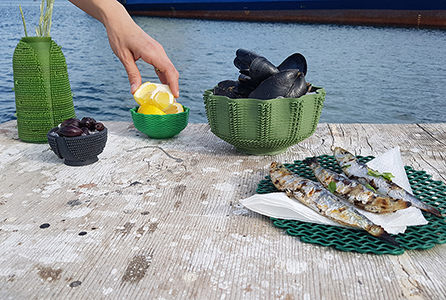Repurposing marine plastic for a circular economy
The latest project from Rotterdam studio The New Raw sees marine pollution from fishing transformed into raw material for 3D printing.

Tuesday, 30 Apr 2019 09:09 GMT

Second Nature works to use marine plastic in 3D printing
From the minds behind Print Your City, The New Raw has launched Second Nature – a project that aims to tackle one of the ocean’s biggest polluters – ghost fishing.
Ghost fishing refers to fishing gear that has been dumped, abandoned or lost in the sea, and is considered to be the deadliest form of ocean debris. Synthetic nets can often lay on the seabed for years, trapping sea life and endangering an already vulnerable environment.
Second Nature aims to transform these ghost nets into a series of 3D printed seashells, highlighting species that are currently protected due to intense fishing. The New Raw spent time with local fishermen in Greece, where it also launched Print Your City, to collect discarded fishing nets.

Repurposed objects created using 3D print and material from discarded fishing nets
“Plastic is a major contributor to the pollution of the seas. However, living in urban regions, we tend to forget about our dependence on the sea, which is crucial to our food and oxygen supply.
"With Second Nature, we want to give plastic a second life,” say Panos Sakkas and Foteini Setaki, founders of The New Raw.
The project has also created tableware produced using 3D printing technology and the material from the fishing nets. The nets are classified according to their material types; nets, ropes, floaters and weights, and are then processed in the grinder and used as filaments for 3D printing.
The Print Your City initiative invited residents of Thessaloniki in Greece to donate their plastic waste and watch it be repurposed as raw material for 3D printing pieces of functional street furniture.
The New Raw’s main aims are to give plastic waste a second life, support new circular economy concepts and create value through the recycling process for local communities, whilst improving and protecting the environment.
As part of the project, the studio was accompanied in its research by award-winning documentary filmmaker Daphne Matziaraki, who created a 10-minute film to illustrate how marine plastic can be used as raw material.
If you have a news story, email summer@linkpublishing.co.uk or follow us on Twitter and LinkedIn to join the conversation.